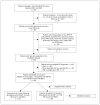Is history of abuse predictive of eating disorders with binge-eating episodes through an effect mediated by impulsivity? A French longitudinal study
- PMID: 36627120
- PMCID: PMC9833835
- DOI: 10.1503/jpn.210218
Is history of abuse predictive of eating disorders with binge-eating episodes through an effect mediated by impulsivity? A French longitudinal study
Abstract
Background: In recent years, many studies have explored the associations among impulsivity, history of abuse, the emergence of eating disorders with episodes of binge eating (EDBE) and their severity. Nevertheless, factors associated with successful clinical outcomes of EDBE are still unknown. Our study aimed to test the hypothesis that a history of abuse is associated with unsuccessful clinical outcomes of EDBE through an effect mediated by impulsivity.
Methods: We assessed patients older than 15 years, 3 months with EDBE at inclusion and at 1 year. Recovery was defined as the absence of eating disorders at 1 year. A mediation analysis was performed by means of structural equation modelling.
Results: We included 186 patients in our analyses (54% bulimia nervosa, 29% anorexia nervosa binge eating/purging type and 17% binge-eating disorder); 179 (96%) were female. One-third (n = 63) of patients reported a history of abuse, and recovery was observed for 20% of the sample (n = 38). Contrary to our assumption, a history of abuse was not associated with the absence of recovery of EDBE at 1 year. Factors unfavourable for achieving recovery were anxiety disorders (odds ratio [OR] 0.41), vomiting (OR 0.39), physical hyperactivity (OR 0.29), negative urgency and a lack of perseverance (OR 0.85 for both). Only positive urgency was positively associated with recovery (OR 1.25).
Limitations: We excluded 219 patients lost to the 1-year follow-up.
Conclusion: Our findings may help to deconstruct the empirical belief that traumatic events may interfere with the successful course of treatment for eating disorders. A high level of positive urgency may be associated with more receptivity to care.
© 2023 CMA Impact Inc. or its licensors.
Conflict of interest statement
Competing interests: None declared.
Figures

References
-
- American Psychiatric Association. DSM-5 : Diagnostic and statistical manual of mental health disorders. Fifth edition. Washington DC: American Psychiatric Publishing; 2013.
-
- Claes L, Vandereycken W, Vertommen H. Impulsivity-related traits in eating disorder patients. Pers Individ Dif 2005;39:739–49.
-
- Fischer S, Smith GT, Anderson KG. Clarifying the role of impulsivity in bulimia nervosa. Int J Eat Disord 2003;33:406–11. - PubMed
MeSH terms
LinkOut - more resources
Full Text Sources
Medical
